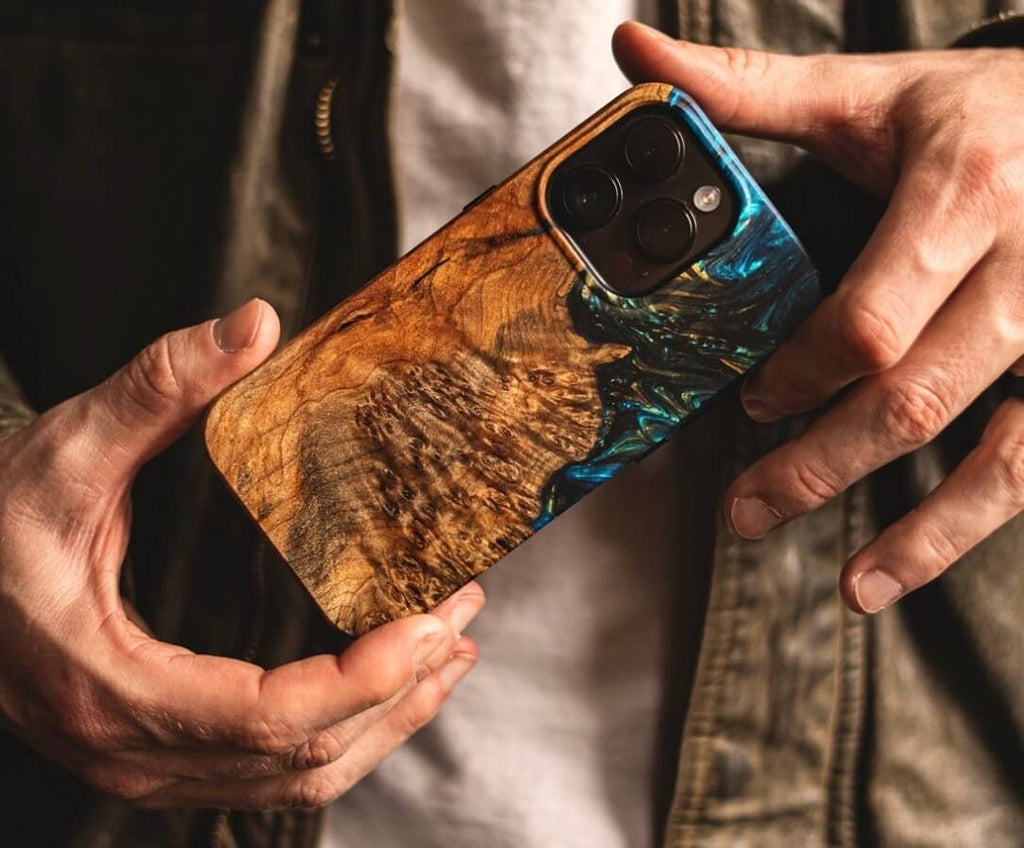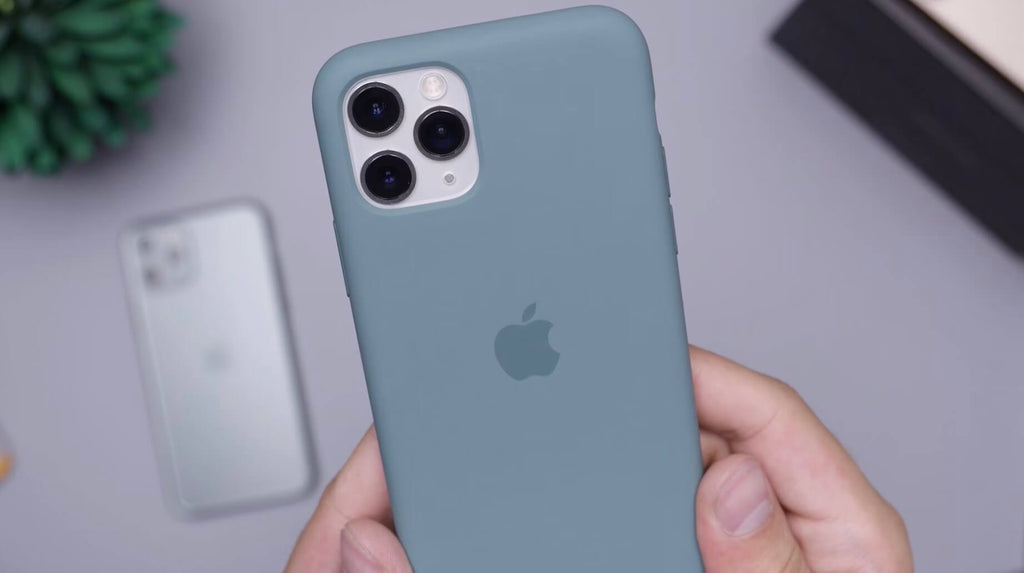
There are only a handful of smartphone models to choose from, but there are hundreds of millions of phone cases out there, each with different colors, patterns, and materials. This can make it difficult to decide which phone case is right for you. Aesthetics aside, phone cases are generally broken down into two categories: hard and soft.
Each type has its own set of features & drawbacks, which makes the decision even more difficult. We’ll break down the key differences, pros, and cons of each to help you decide whether a hard or soft phone case is right for you.
Hard Phone Cases

From business professionals to outdoor enthusiasts, hard phone cases pack plenty of protection into a sleek, minimal frame. But they might not be for everyone; here’s are the pros & cons of hard phone cases:
Pros
-
Enhanced Protection – Hard cases protect the phone from direct impacts, scratches, and daily wear & tear.
-
Sleek, Attractive Design – Whether you’re looking for a solid-colored, matte finish or an elegant, wooden design, your case will be the talk of the dinner table.
- Long-Term Durability – Unlike soft cases, hard cases resist stretching or deforming over time, maintaining their shape and fit for the life of your phone.
Cons
-
Comfort & Grip – Hard cases can be slippery and uncomfortable to hold for extended periods, increasing the chances of accidental drops. Carved cases come with a grippy outer shell for added grip.
-
Shock Absorption – Though they protect against small drops & impacts, hard materials are less effective at absorbing shock than soft materials. We solve this problem at Carved with a soft, protective perimeter around the wooden phone case.
- Cosmetic Damage – Hard cases are more prone to visible scratches and scuff marks, which can tarnish their appeal over time.
Soft Phone Cases

With millions of colors & designs to choose from, soft phone cases pack sufficient drop protection in a fun, creative look. Wondering if a soft phone case might be for you? Here’s what everyone else says about them:
Pros
-
Built-In Shock Absorption – Soft cases are more effective at absorbing shock because of their flexibility. Materials like silicone provide sufficient cushioning for phones that are dropped from a few feet above the ground.
-
Comfort & Grip – Silicone & other soft phone cases are easier to grip, reducing the chances of accidental drops.
- Unlimited Designs – Millions of soft cases are designed & created each day, with different combinations of styles, colors, and patterns. Compared to hard cases, there are far more styles available.
Cons
-
Durability – Soft phone cases are prone to wear and tear over time, gradually losing their shape or stretching with use.
-
Scratch Resistance – Despite their shock absorption, soft cases are less effective against minor incidents like direct scratches or abrasions.
- Cleanliness – Light and clear-colored soft cases often discolor after a few weeks of use, meaning you’ll have to clean or replace them more regularly to maintain their original look.
Hard vs. Soft Phone Cases: How Do They Stack Up Against Each Other?
We’ve covered the pros & cons of each type of case, but how do they measure when compared to each other? Let’s take a look.
Protection
Hard cases are more rigid and provide better protection against direct impacts, small drops, and scratches. But soft cases, like those made of rubber, are more effective at absorbing shocks from higher drops. In the same light, cases made from soft materials can wear down & tear more easily than hard materials, reducing their protection against direct impacts & scratches. Many phone cases combine both hard & soft materials to blend the best of both worlds: scratch & drop defense.
Durability
Hard cases, like those made of wood, metal, or rigid plastic, are generally more durable than soft cases. As a result, they are prone to cosmetic damage like scratches & chipped edges, though wood tends to hold up better than plastic. Soft cases made of rubber or silicone tend to rip & stretch out over time, drastically reducing their lifeline & protection abilities.
For an in-depth breakdown of the most popular phone case materials, see our Buyer’s Guide to the Best Phone Case Materials.
Comfort & Usability
Hard cases are designed to add as little bulk as possible and maintain the original shape of your smartphone model. Some people say that hard cases tend to be more slippery than soft ones, though most of them have built in ridges or added grip to negate this issue. Straight out of the box, soft cases tend to be easier to grip, meaning you’re theoretically less likely to drop the device. However, overly flexible & grippy soft cases might make it harder to insert the phone into pant pockets or small purses.
Not sure which size case your phone needs? Check out our size chart for the latest Apple iPhone, Samsung Galaxy, and Google Pixel models.
Design & Aesthetics
The design of your phone case may be the most important decision-making factor, or you may not care at all. If you just want a simple, protective case that’s perfect for your everyday carry, you should purchase a hard case. Generally, they have a more formal & upscale appearance compared to soft cases, especially ones with solid, matte-colored designs. On the other hand, if the look of your phone case is the most important thing to you, you should opt for a soft phone case. They tend to be available in a wider range of styles, colors, and patterns. You can even swap them out each day, from playful & quirky to simple & vibrant, then back again.
Price
Phone cases vary in price, regardless of whether they’re made from hard or soft materials. Depending on the brand, design, and construction quality, they can range anywhere from $10 to $300. But generally, the materials & processes required to produce hard cases are more expensive, resulting in a higher retail price.
If you want your smartphone to last until your next upgrade or the newest model is released, you need a protective phone case. It will help protect your device from cracks, scratches, drops, and even water & dust. Hard phone cases offer superior protection & durability, and are finished with a sleek, professional exterior. Soft cases, on the other hand, offer shock absorption, comfort, and a myriad of design options, but their durability leaves much to be desired. Because there are obvious drawbacks of both, your best bet is to select a case made of both hard & soft materials. The hard outer shell will protect you from regular damage and the rubber cushioning will support your phone when dropped. Ultimately, your decision to choose a hard case or a soft case will boil down to your lifestyle, aesthetic preferences, and the level of protection you need for your phone.


